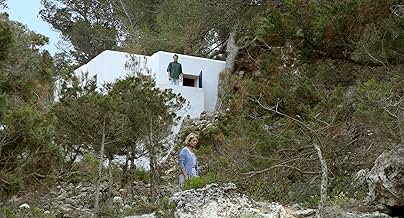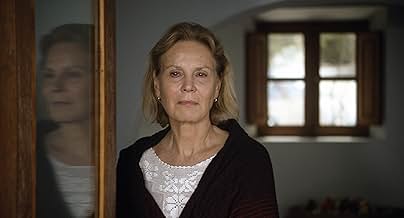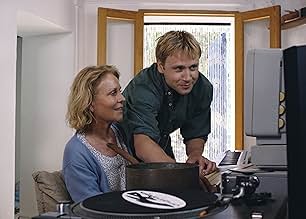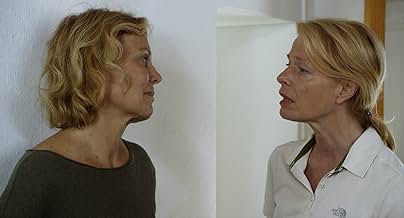Amnesia
- 2015
- 1 Std. 36 Min.
IMDb-BEWERTUNG
6,1/10
1230
IHRE BEWERTUNG
Füge eine Handlung in deiner Sprache hinzuJo has come to Ibiza to be a DJ in the club Amnesia. He befriends a solitary woman who's trying to forget her past. As Jo draws her into techno music, Martha puts everything she had previous... Alles lesenJo has come to Ibiza to be a DJ in the club Amnesia. He befriends a solitary woman who's trying to forget her past. As Jo draws her into techno music, Martha puts everything she had previously lived by into question.Jo has come to Ibiza to be a DJ in the club Amnesia. He befriends a solitary woman who's trying to forget her past. As Jo draws her into techno music, Martha puts everything she had previously lived by into question.
- Auszeichnungen
- 1 Nominierung insgesamt
Florentin Groll
- Otto
- (as Florentín Groll)
Empfohlene Bewertungen
This film is a great example of what I think of as European sensibility: the characters, be they male or female, old or young, are not afraid or ashamed of being thoughtful, sensitive, and introspective. There is a gentleness that is often found in European films of this type, that is not in their American counterparts. There is a slowness as the camera lingers on scenes, such as the sea in the distance, or the sun setting, and on details, such as plants in the garden, or a candelabra lighting a room at night. The European sensibility, combined with the story being told here, of one woman's perspective of World War II remembering it from many years after it happened, create a poignant and beautiful story about living, growing older, and the relationship of people to each other and to the beauty offered by nature and the earth. I loved it.
I don't get it. A beautiful German or Swiss woman moves to the Spanish island of Ibiza for 50 years, because she is ashamed of being German. But how does she pay her bills, and why is there no man in her life, or children? What has she been doing for 50 years? Just watering her plants, shopping for tomatoes, and brooding about her nationality? Well, Marthe Keller is certainly one of the most attractive 70 year olds you will see. She does a nice job of conveying pain, as do the other actors. But I'm sorry. You have to explain more.
The dialogue between her and the boy's mother is excellent. The mother points out the futility of a life lived in protest, when she was never guilty of anything to begin with. The self-righteousness of it.
But we need more of a back story. It took half the picture just to hear the back story that we did get. And that was not even close to enough.
Also, how could the German characters not recognize her German accent? Hee hee. They were so shocked to find out that she was German.
It's a thoughtful film, well acted, and well photographed. But I don't recommend it. Too slow and too cryptic.
The dialogue between her and the boy's mother is excellent. The mother points out the futility of a life lived in protest, when she was never guilty of anything to begin with. The self-righteousness of it.
But we need more of a back story. It took half the picture just to hear the back story that we did get. And that was not even close to enough.
Also, how could the German characters not recognize her German accent? Hee hee. They were so shocked to find out that she was German.
It's a thoughtful film, well acted, and well photographed. But I don't recommend it. Too slow and too cryptic.
Set on the island of Ibiza, Spain, in 1990, this latest movie from the acclaimed Swiss director Barbet Schroeder is a quiet yet absorbing drama.
The two leads here Marthe Keller and Max Riemelt are both excellent in their roles of Martha and Jo respectively. Martha is an expatriate from Germany who has rented a house in Ibiza for years, overlooking the beautiful Mediterranean Sea. The much younger Jo, a native Berliner, has just moved in as Martha's neighbor, with aspirations of creating and playing his own techno music in the thriving local clubs.
Despite the difference in their ages, there is an immediate chemistry and comfort level between the two. Martha, however, having left Germany in 1936, during the time of Hitler and the Nazis, has been so revolted by the actions of her countrymen during the war that she has refused to speak the German language to this day, has not returned to her native country, or used any products manufactured by the Germans such as VW's.
On the other hand, Jo only has learned of the war and the Nazis through school and from filtered stories from his mother and grandfather. Thus he has the attitude of not dwelling in the past but moving forward, not only individually but for his native Germany as well. When Jo's mother and grandfather arrive in Ibiza from Berlin for a visit, some truths about the Nazi horrors will emerge, leading to changes for all concerned.
There are two concurrent themes being played out in the movie. The first being that of a possible May-December relationship between Martha and Jo. The second being how some Germans choose to have selective amnesia about what really occurred during WW2 and want to just move on and leave all that for the history books.
All in all, I found this to be a well acted, quiet, and cerebral film that I found myself engaged in from start to finish. It also has some wondrous cinematography of the Mediterranean Sea and surrounding areas.
The two leads here Marthe Keller and Max Riemelt are both excellent in their roles of Martha and Jo respectively. Martha is an expatriate from Germany who has rented a house in Ibiza for years, overlooking the beautiful Mediterranean Sea. The much younger Jo, a native Berliner, has just moved in as Martha's neighbor, with aspirations of creating and playing his own techno music in the thriving local clubs.
Despite the difference in their ages, there is an immediate chemistry and comfort level between the two. Martha, however, having left Germany in 1936, during the time of Hitler and the Nazis, has been so revolted by the actions of her countrymen during the war that she has refused to speak the German language to this day, has not returned to her native country, or used any products manufactured by the Germans such as VW's.
On the other hand, Jo only has learned of the war and the Nazis through school and from filtered stories from his mother and grandfather. Thus he has the attitude of not dwelling in the past but moving forward, not only individually but for his native Germany as well. When Jo's mother and grandfather arrive in Ibiza from Berlin for a visit, some truths about the Nazi horrors will emerge, leading to changes for all concerned.
There are two concurrent themes being played out in the movie. The first being that of a possible May-December relationship between Martha and Jo. The second being how some Germans choose to have selective amnesia about what really occurred during WW2 and want to just move on and leave all that for the history books.
All in all, I found this to be a well acted, quiet, and cerebral film that I found myself engaged in from start to finish. It also has some wondrous cinematography of the Mediterranean Sea and surrounding areas.
Barbet Schroeder's last opus could not be more aptly titled than "Amnesia". His film indeed concerns not one but three different cases of chosen amnesia : one symbolized by a nightclub whose (actual) name, "Amnesia", suggests a place where you forget your problems and where you dance to a new type of music (electronic dance) that obliterates the music of the past ; the second sort of willful oblivion is the one exercised by Jo, the young German musician of the story, his mother, his grandfather and by extension, the bulk of the German people when it comes to the Nazi past of their country ; the third kind of intended forgetfulness is embodied by the heroin, Martha, who, after being traumatized by Nazi acts of violence she once witnessed has vowed to reject everything German, starting with speaking her mother tongue.
All these notions materialize in a plot taking place on the island of Ibiza in the early 1990s, shortly after Reunification, and revolving around Martha, the German woman who does not want to hear about anything German. Sixty-year-old and happy with the house she lives in and the lovely nature surrounding it, Martha lives by herself most of the time. One day though, her new neighbor Jo, a young musician from Berlin, lands on her doorstep in need of something. And despite his being received coolly on this occasion, the young man soon grows fond of her, and she of him. But the odd thing is that both communicate in English, Jo being unaware Martha is German. How will Jo react when he learns that her new friend is German like him without her telling him and realizes how ludicrous it is for the two of them to express themselves in a foreign idiom instead of their mutual native language...?
As you can see, the storyline is thin, very thin : it definitely lacks the scope necessary to do full justice to the lofty themes Barbet Schroeder, the director of such great movies as "More", "Reversal of Fortune" or "Terror's Advocate", has undertaken to deal with. Yet the result is an interesting, at times touching, albeit quite uneven little film, the first part faring better than the second one. Which is too bad since in such a case the final impression you get is negative even if, as a whole, the movie is quite acceptable. The trouble in this section, as a matter of fact, is Barbet Schroeder's inability to give flesh to his characters, since they are used almost exclusively to convey ideas. In these conditions it comes as no surprise that "Amnesia" finds its nadir then, as illustrated by the dinner sequence in which Jo's grandfather (Bruno Ganz) confesses his guilt. Meant as an emotional climax the scenes not only fail to shake the viewer but sink into grandiloquence and ridicule as well. Simply because the director has not managed to make us believe the grandfather was a human being; to us he is only the puppet of an abstract notion.
This is all the more regrettable as in the first part the writer- director has shown he could manage to delineate his characters with subtlety. Martha and Jo, unlike the grandfather, not only exist (both their qualities and defects are pinpointed) but they also react to each other (with amusement, annoyance, wonder, etc.) as any living creature does. Which is evidenced by a few scenes involving Marthe Keller (sparkling) and Max Riemelt (pleasant) oozing charm, emotion and humor. Unfortunately, ideas gradually erase life and prevent "Amnesia" from being the great film it could have been. Not a bad one either, for even if it does not satisfy you fully, it deals with an interesting subject and is performed by a wonderful actress. Sufficient reason indeed to justify buying a ticket at your favorite theater.
All these notions materialize in a plot taking place on the island of Ibiza in the early 1990s, shortly after Reunification, and revolving around Martha, the German woman who does not want to hear about anything German. Sixty-year-old and happy with the house she lives in and the lovely nature surrounding it, Martha lives by herself most of the time. One day though, her new neighbor Jo, a young musician from Berlin, lands on her doorstep in need of something. And despite his being received coolly on this occasion, the young man soon grows fond of her, and she of him. But the odd thing is that both communicate in English, Jo being unaware Martha is German. How will Jo react when he learns that her new friend is German like him without her telling him and realizes how ludicrous it is for the two of them to express themselves in a foreign idiom instead of their mutual native language...?
As you can see, the storyline is thin, very thin : it definitely lacks the scope necessary to do full justice to the lofty themes Barbet Schroeder, the director of such great movies as "More", "Reversal of Fortune" or "Terror's Advocate", has undertaken to deal with. Yet the result is an interesting, at times touching, albeit quite uneven little film, the first part faring better than the second one. Which is too bad since in such a case the final impression you get is negative even if, as a whole, the movie is quite acceptable. The trouble in this section, as a matter of fact, is Barbet Schroeder's inability to give flesh to his characters, since they are used almost exclusively to convey ideas. In these conditions it comes as no surprise that "Amnesia" finds its nadir then, as illustrated by the dinner sequence in which Jo's grandfather (Bruno Ganz) confesses his guilt. Meant as an emotional climax the scenes not only fail to shake the viewer but sink into grandiloquence and ridicule as well. Simply because the director has not managed to make us believe the grandfather was a human being; to us he is only the puppet of an abstract notion.
This is all the more regrettable as in the first part the writer- director has shown he could manage to delineate his characters with subtlety. Martha and Jo, unlike the grandfather, not only exist (both their qualities and defects are pinpointed) but they also react to each other (with amusement, annoyance, wonder, etc.) as any living creature does. Which is evidenced by a few scenes involving Marthe Keller (sparkling) and Max Riemelt (pleasant) oozing charm, emotion and humor. Unfortunately, ideas gradually erase life and prevent "Amnesia" from being the great film it could have been. Not a bad one either, for even if it does not satisfy you fully, it deals with an interesting subject and is performed by a wonderful actress. Sufficient reason indeed to justify buying a ticket at your favorite theater.
We don't need a 500-word review to understand this film is very personal for Barbet Schroeder. It would have been a better movie, had the young man and older woman engaged in a sexual relationship in the first act. The idea of a summer love affair between these two Germans, from separate generations - would have had a much deeper gravity for the viewer, in my opinion.
Wusstest du schon
- WissenswertesDirector Barbet Schroeder used the same principal location in Amnesia (2015) and More - mehr - immer mehr (1969). The white house near Sant Antoni de Portmany, Ibiza was built in 1935 and acquired by Schroeder's mother in 1951.
- PatzerThe story takes place in 1990, yet towards the end of the movie the female protagonist takes a ride on a car with a modern E.U. format plate, which weren't introduced until 1998, and a registration code from the mid 2010s to boot.
- VerbindungenReferences Nosferatu, eine Symphonie des Grauens (1922)
- SoundtracksBehind My Soul
Performed by Lucien Nicolet (as Lucien N Luciano)
Written, produced and arranged by Lucien Nicolet
Top-Auswahl
Melde dich zum Bewerten an und greife auf die Watchlist für personalisierte Empfehlungen zu.
- How long is Amnesia?Powered by Alexa
Details
Box Office
- Bruttoertrag in den USA und Kanada
- 8.700 $
- Eröffnungswochenende in den USA und in Kanada
- 1.202 $
- 23. Juli 2017
- Weltweiter Bruttoertrag
- 8.700 $
- Laufzeit1 Stunde 36 Minuten
- Farbe
- Seitenverhältnis
- 1.85 : 1
Zu dieser Seite beitragen
Bearbeitung vorschlagen oder fehlenden Inhalt hinzufügen































